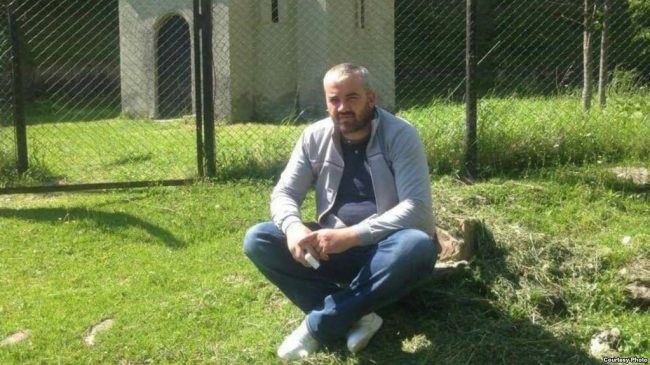

 The European Union has expressed ‘grave concern’ at the death of a Georgian citizen and former soldier in a custody in Tskhinvali (Tskhinval), calling for more transparency.
The European Union has expressed ‘grave concern’ at the death of a Georgian citizen and former soldier in a custody in Tskhinvali (Tskhinval), calling for more transparency.
Thirty-five-year-old Archil Tatunashvili died in the early hours of 23 February, according to the authorities in South Ossetia, after ‘falling down the stairs’. Georgian officials have condemned his detention and called for an investigation into his death.
[Read on OC Media: Georgian citizen dies in custody in South Ossetia]
The EU issued a statement on 25 February, saying that Tatunashvili’s death and the detention of two others ‘are a source of grave concern’.
They said they are ready to ‘support ongoing investigations and to facilitate discussions through the Incident Prevention and Support Mechanism and the Mission Hotline’. The Incident Prevention and Response Mechanism includes regular meetings between Georgian and South Ossetian officials. The next meeting has been pushed forward to 26 February to discuss the incident.
The European Union Monitoring Mission (EUMM) said in a separate statement a day earlier that they continue to ‘follow developments closely’ in their monitoring capacity and in line with their mandate.
They said it was important that ‘all necessary documentation is exchanged to ascertain the cause of death of the deceased’ and that they looked forward to a ‘full, thorough and transparent examination’.
Toivo Klaar, EU Special Representative for the South Caucasus and the crisis in Georgia, also wrote on Twitter that he was ‘very concerned’.
Very concerned about death in custody in Tskhinvali of GEO citizen Archil Tatunashvili. EUMM hotline was activated and upcoming IPRM right format to establish facts
— Toivo Klaar (@ToivoKlaar) February 23, 2018
A ‘timely response’
According to a statement from Georgia’s Foreign Ministry, two other Georgian citizens, Levan Kutashvili and Ioseb Pavliashvili, remain in a custody in Tskhinvali.
In their statement, the EU called for the release of Kutashvili and Pavliashvili, and for the South Ossetian authorities to ‘urgently ensure that they are allowed to travel to Tbilisi Administered Territory’. They added that there is a need for ‘additional measures to ensure transparency and improve confidence’.
South Ossetian authorities have so far denied EUMM any access to the territories under their control.
Georgia’s foreign minister Mikheil Janelidze said ‘despite provocations from the occupation regime, we will not abandon our peacekeeping policy and continue our efforts, aimed at unifying our society, and no obstacles will prevent this process’.
In a statement, the ministry blamed Russia for Tatunashvili’s death, requesting that the co-chairs of the Geneva Discussions make sure of a ‘timely response’, so that the circumstances can be ‘immediately determined’.
The Geneva Discussions were set up in the aftermath of the 2008 war in South Ossetia. They are co-chaired by the EU, UN, and OSCE, and involve negotiators from Georgia, Russia, the United States, Abkhazia, and South Ossetia.
‘Hard to say how the story will end’
Natia Nadiradze, former Caucasus project manager at UK-based peacebuilding group Saferworld, told OC Media that during six years of working across the dividing line, Saferworld talked to a number of people who were detained by the South Ossetian authorities but never heard complaints that could qualify as torture.
‘Although the conditions in custody were not pleasant (and the entire de facto penitentiary system can be characterised by this), we did not hear specific complaints about the treatment of detainees that could be qualified as inhumane treatment or torture’.
Nadiradze said South Ossetia’s ‘inconsistent and suspicious justification […of Tatunashvili’s death] will further increase the distrust between the parties’. According to her, ‘given the lack of direct communications between the two sides, and because the international community has almost no leverage, it’s hard to say how the story will end’.
Death after ‘falling down the stairs’
The South Ossetian KGB claimed that as prison guards took Tatunashvili to his cell, he grabbed the gun of one of his captors. He was injured and fell down the stairs as guards attempted to stop him, according to their statement.
They claimed that Tatunashvili, unable to breathe, was rushed to a hospital, where he died two hours later.
Tatunashvili was detained on 22 February in Akhalgori (Leningor) and brought in for questioning in Tskhinvali. The KGB had accused him of being an informant for the Georgian special services, and ‘participating in Georgian aggression in 2004–2008’.
They also claimed Tatunashvili had ‘footage of military infrastructure in South Ossetia’. According to the KGB, they presented to him ‘documents which proved his involvement in hostilities’.
Tatunashvili served in the Georgian armed forces from 2007–2011. He was serving in Iraq during the August 2008 war, and had also served in Afghanistan, according to Radio Tavisupleba, RFE/RL’s Georgian service.
For ease of reading, we choose not to use qualifiers such as ‘de facto’, ‘unrecognised’, or ‘partially recognised’ when discussing institutions or political positions within Abkhazia, Nagorno-Karabakh, and South Ossetia. This does not imply a position on their status.








